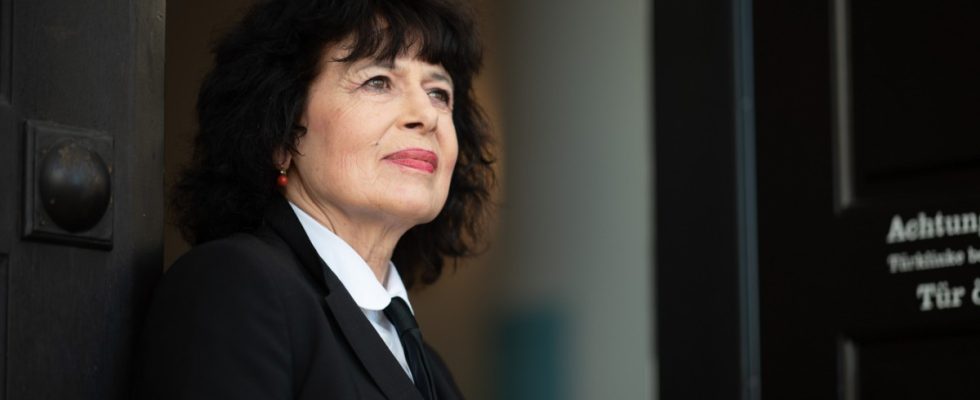The writer Monika Helfer is contacted by a childhood friend whom she has hardly seen in over forty years. “Moni, write a page about me,” she demands, “because when I die, something of me will still be there.” It was her 70th birthday when the friend’s letter came, Helfer reveals in her book “The Virgin.” In it, as in three of her previous novels, she tells the story with all the signs of autobiographical authenticity: she talks about herself as Monika, her life as a writer, her husband “Michael”, in whom the writer Michael Köhlmeier can be recognized.
Monika Helfer’s 70th birthday would have been shortly before the resounding success of her book “Die Baggage” from 2020. With this family history, her career started again late. It became a bestseller after the previous novels and collections of short stories had received less attention than, for example, those by Michael Köhlmeier. And “Vati” from 2021 and “Löwenherz” from 2022 are also widely read and loved life stories.
Since then, almost all newspapers and media outlets in German-speaking countries have sent reporters to her in Hohenems in Vorarlberg to describe Helfer and Köhlmeier’s living room, which is densely populated with pictures and memorabilia, and to admire a harmonious marriage of poets in which the balance had shifted: Now the rule was the main interest was Monika Helfer, and her husband stood in the kitchen making Kaiserschmarrn.
“I read all your interviews,” says the friend in Helfer’s new book: “I type your name into Google, press news and the last twenty-four hours, and then I see what’s new about you.” In the past few years she could have learned a lot about the loving, sensual, successful life of Monika Helfer. While the narrator Monika finds her friend lonely and weathered, in exactly the situation in which she seems to have been stuck for decades: in her deceased mother’s house, wearing a kimono on her thinning body, just like the one she had worn: “An eternal girl”. So she doesn’t present an image that would fit her brilliant name “Gloria”.
“Gloria had always been one to ignite my imagination”
As a child, Gloria made up imaginative stories to replace what she was missing: the father, about whom her mother only revealed contradictory things. Gloria embellished it, convincing herself above all, until she was halfway on the way from Bregenz to an imaginary father at 147 Ludlow Street, Manhattan. Even the young Monika sees through the self-deception.
In her friend she gets to know a character type who, whatever she does, easily outsmarts her: “She wasn’t flirting, she was just playing flirting.” And yet this certain energy emanates from her: “Gloria was always someone who ignited my imagination, into beautiful images and less beautiful ones.”
Monika Helfer’s own text about this friendship sends all the literary signals for the authenticity of her story, from the biographical features to her sober, pragmatic tone. In an interview with the star But she states: “There is 30 percent truth in it, 70 percent is fiction. I put Gloria together from many friends.”
Monika Helfer: The Virgin. Novel. Carl-Hanser-Verlag, Munich 2023. 152 pages, 22 euros.
(Photo: Hanser/Hanser)
In doing so, she has created a counter-figure for herself: Monika comes from a very humble background in the poorly-reputed South Tyrolean settlement in Bregenz. Gloria and her mother live in more rooms than they can live in and “bought everything and of everything and always too much.” Monika is unsure; Gloria says: “She wouldn’t have been able to make the others indifferent.” Gloria presents herself as a femme fatale, Monika has her experiences but doesn’t talk about them.
Gloria goes to drama school in Vienna, begins a bohemian life, Monika stays in Bregenz and becomes a mother, her first husband is “someone that Gloria would have loved to have. He was a man who made me more enviable than I was.” Marriage itself tends to embarrass her.
When they were over forty, Monika had four children, and her second marriage was a happy artistic union. And Gloria begs: “At least tell me what it’s like to have a child, Moni.” When they meet again in their seventies, Gloria confesses her secret: “I’ve never slept with a man.”
The word “virginity” comes to Monika Helfer’s mind, as if it were more of an attitude than something that actually happened to her friend. In any case, the two women in this book compete brutally, are closely linked, mirror each other, physically down to the body odors and existentially: one represents for the other life as it could have been.
“Can’t a life of imagination also be called reality?”
According to the first impression, this is how it happened: all the stories that Gloria told about herself didn’t hold up, didn’t come true, she is lonely in the midst of her illusions, while Monika lives a life to the full. In her story about the friend she includes this disclaimer: “In a life in which reality is pushed into insignificance by imagination, the question of truth must sound strange. As a linguistic troublemaker. May a life in imagination “Can’t we also call it reality?” Are these really questions about Gloria, or rather those of a writer’s life, i.e. her own?
She also shifts the question of the genre that has recently brought Monika Helfer so much success, autofiction, to the other: “If someone keeps saying ‘I’, that doesn’t necessarily mean that they like the way they are. Gloria says ‘I’ and looks at me pleadingly. ‘Me, me, me!'”
So there stands the I that wants to become literature, face to face with the experiencing and narrating I. And with this female version of the doppelganger motif, Monika Helfer plays through the urgent questions of art and life in the 21st century in her modestly amusing way.

